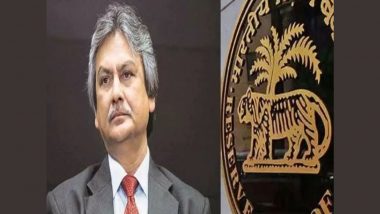New Delhi, June 24: The ongoing geopolitical developments in Ukraine have challenged India's economic prospects, thereby darkening the country's outlook and making it highly uncertain, said the Reserve Bank of India's Deputy Governor Michael Patra. Patra made the remarks at a PHD Chamber of Commerce and Industry event titled 'Geo-Political Spill-overs and Indian Economy' held here on Friday.
This geopolitical tension threatened to snuff out the economic recovery that was making its way through multiple waves of the pandemic and through multiple mutations of the virus. In a span of just two months, RBI revised the real GDP growth forecast down from 7.8 per cent to 7.2 per cent.
In India, retail inflation has been over the RBI's upper tolerance band of 6 per cent for the fifth consecutive month in a row in May, while the Indian central bank projects that it would continue to remain high till the third quarter of the current financial year 2022-23, before moderating. Besides, domestic wholesale inflation has been in double-digit for over a year now. World Bank Cuts India’s 2022–23 Growth to 7.5%, Still on Top Spot As World’s Fastest-Growing Economy.
Inflation is projected to remain 7.5 per cent in the first quarter of the current financial year FY23. In the second quarter, it is projected at 7.4 per cent. For the third quarter, it is projected at 6.2 per cent. It may be noted that around 75 per cent of the increase in inflation projections can be attributed to the food group.
Like other emerging market economies, India too faces major risks, immediate one being soaring crude oil prices, tightening financial conditions, capital outflows, and supply chain disruptions, which clouded on the country's economic outlook, Patra said.
That said, India's external sector is, however, well buffered with reasonably high reserves and a "very modest" current account deficit, and "extremely modest" debt levels as compared to other peers, he said, adding that it is prudent to be watchful about the rising intensity and density in the scale of headwinds from the geopolitical conflict.
In order to tame the inflationary pressure and anchor inflationary expectations, the RBI in its latest monetary policy committee review earlier this month decided to hike the policy repo rate by 50 basis points to 4.9 per cent.
Patra further said that there has been a decline in India's current account deficit (CAD), and it should be "noticed" because traders in the foreign exchange market are betting that the country's CAD is going "haywire".
But the fact is, he said, the CAD has declined to 1.5 per cent of GDP in Q4 of FY22 from 2.6 per cent in Q3, which augurs well for external viability. On the recent announcement of the revision of MSP for 14 major kharif crops, he said the revisions have been kept modest, averaging at 6.1 per cent, and is a positive indicator for inflation.
(The above story is verified and authored by ANI staff, ANI is South Asia's leading multimedia news agency with over 100 bureaus in India, South Asia and across the globe. ANI brings the latest news on Politics and Current Affairs in India & around the World, Sports, Health, Fitness, Entertainment, & News. The views appearing in the above post do not reflect the opinions of LatestLY)













 Quickly
Quickly


